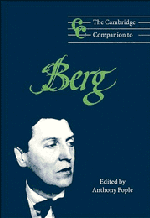13 - Berg and the twentieth century
from Part 4 - Postscript
Published online by Cambridge University Press: 28 September 2011
Summary
The modern and the plural
As an ‘Age of Extremes’ with a vigorously diverse mainstream, the twentieth century – in music as in other respects – does not lend itself to straightforward summarising, or the tracing of unambiguously consistent tendencies and trajectories, involving clear-cut lines of influence and dependency. What can be demonstrated, if the musical history of the century is surveyed, are networks of shared concerns which involve many different composers in many different ways, with many degrees of connection and divergence. To tell the story of twentieth-century music with Berg as a central character would require a particularly sensitive interpretation of such networks. The possibility that Berg could be an ‘indispensable’ figure has nevertheless been acknowledged for some time – for example, in a striking assessment by Pierre Boulez, first published in 1958, and all the more important for the ways in which it modifies Boulez's own earlier (1948) and much more hostile ‘reception’ of the composer. Observing first that Berg's ‘influence’ was ‘at present less decisive than that of Webern, despite the greater immediate range of his music’, Boulez continued:
It is likely that when the question of modern style becomes more settled Berg's influence will be able to make itself felt more profitably. It would in any case be superficial to see in Berg no more than a heroic figure rent by contradictions or to think of him merely as the culmination of romanticism on whom it would now be pointless to model oneself. On the contrary, by detaching the contradictions that are the key to his work from the particular context which gave them birth, it is possible to learn from Berg an extremely valuable lesson in aesthetics. His work retains intact all its potential for influence; and it is this which makes him indispensable to the musical domain of our time.
- Type
- Chapter
- Information
- The Cambridge Companion to Berg , pp. 245 - 258Publisher: Cambridge University PressPrint publication year: 1997

